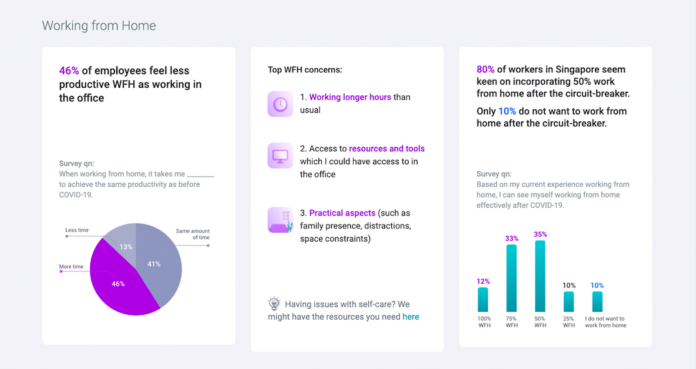More than 80% of employees in Singapore wish to continue working from home even after Circuit Breaker, according to a survey by EngageRocket, Institute of HR Professionals, and Singapore HR Institute.
Since the survey was launched last April 13, more than 2,700 employee responses have been analysed.
In April, EngageRocket in partnership with the IHRP and the SHRI put together a People Continuity Package aimed at enhancing Work-From-Home (WFH) effectiveness. They said hundreds of companies have since signed up for this publicly available resource that allows organisations to gain a deeper understanding of their telecommuting effectiveness, employee engagement, and their well-being.
Results show that employees view WFH as desirable but it imposes a tax on productivity. Even then, 80% of employees wish to continue working from home half their time or more post-Circuit Breaker, while 10% do not want to work from home after the Circuit Breaker.
Close to half (46%) report lower productivity, taking more time to achieve the same as before. Main challenges include practical aspects such as family presence, distractions and space constraints (22%); working longer hours than usual (22%); and inability to access resources and tools that they could have in the office (21%).
“COVID-19 has ended the debate whether or not companies should offer telecommuting. The next step for many companies, however, is to couple this flexibility with employee engagement programmes that helps to alleviate the productivity challenges,” said Mayank Parekh, CEO of IHRP.
Also, mental health and stress are taking a toll on employees. A quarter of respondents said so, mostly driven by concerns around the health and economic impact on the country (67%); that their productivity and performance will be impacted due to working from home (64%) and; the possibility that a member of their family might contract COVID-19 (57%).
Results further reveal that engaged employees are more confident of and committed working towards the company’s success in a crisis.
“While ensuring business continuity is important through such crises, the need to engage employees effectively is a critical factor determining how quickly companies can rebound when the economy recovers,” said Leong Chee Tung, co-founder and CEO of EngageRocket.
















